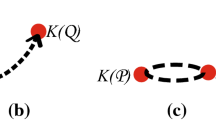Abstract
Knowledge base theory stimulates numerous applications of computer algebra and symbolic computations. The paper is aimed to explain how the general ideas of Galois theory work for knowledge bases and help to determine the criterion of knowledge bases informational equivalence. This criterion reduces the problem of informational equivalence of knowledge bases to the conjugacy problem for groups. We give a survey of recent results and outline prospective problems.
Similar content being viewed by others
Explore related subjects
Discover the latest articles, news and stories from top researchers in related subjects.References
Aho, A.V., Sagiv, Y., Ullman, J.D.: Equivalences among relational expressions. SIAM J. Comput. 8(2), 218–246 (1979)
Atzeni, P., Aussiello, G., Batini, C., Moscarini, M.: Inclusion and equivalence between relational database schemes. Theor. Comput. Sci. 19, 267–285 (1982)
Bancillon, F.: On the completeness of query language for relational database. Lect. Notes Comput. Sci. 64, 112–123 (1978)
Baik, K.H., Miller, L.L.: Topological approach for testing equivalence in heterogenous relational databases. Comput. J. 33(1), 2–10 (1990)
Beeri, C., Mendelzon A., Sagiv Y., Ullman J.: Equivalence of relational database schemes. In: STOC ’79 Proc. of the 11-th Annual ACM Symp. on Theory of Computing, pp. 319–329. ACM (1979)
Beniaminov, E. M.: Algebraic Invariants of Database Schemes. In: Proceedings of the 2-d Int. Workshop on Advances in Databases and Information Systems (ADBIS’95), vol. 1, pp. 259–263. Moscow (1995)
Beniaminov, E.M.: Algebraic Methods in Database Theory and Representation Of Knowledge. Russian, Nauchnyj Mir, Moscow (2003)
Cannon, J.J., Holt, D.F.: Automorphism group computation and isomorphism testing in finite groups. J. Symbol. Comput. 35(3), 241–267 (2003)
Conway, J.H., Curtis, R.T., Norton, S.P., Parker, R.A., Wilson, R.A.: Atlas of Finite Groups. Clarendon, Oxford (1985)
Hahn, T. (ed.): International Tables for Crystallography, Volume A: Space Group Symmetry, A, 5th edn, Berlin (2002)
Halmos, P.R.: Algebraic Logic. New York (1969)
Henkin, L., Monk, J.D., Tarski, A.: Cylindric Algebras. North-Holland Publ (1995)
Heuer, A.: Equivalent schemes in semantic, nested relational, and relational database models. Lect. Notes Comput. Sci. 364, 237–253 (1989)
Hulek, K.: Elementary algebraic geometry. Stud. Math. Lib. 20, AMS (2003)
Harju, T., Karhumaki, J.: The equivalence problem of multitape finite automata. Theor. Comput. Sci. 78, 347–355 (1991)
Knyazhansky, M.: Categorical model of knowledge base and its applications to knowledge bases equivalence verification. Ph.D. thesis, Bar Ilan University (2010)
Knyazhansky, M., Plotkin, T.: Automorphic equivalence of multi-models recognition. Armen. J. Math. 1(2), 10–24 (2008)
Knyazhansky, M., Plotkin., T.: Knowledge bases and automorphic equivalence of multi-models versus linear spaces and graphs. Discuss. Math. Gen. Algebra Appl. 29(2) 203–213 (2009)
Krasner, M.: Généralisation abstraite de la théorie de Galois. Colloq. Int. CNRS (Algèbre et théorie des nombres) 24, 163–168 (1949)
Kuros, A.G.: The Theory of Groups. Chelsea, New York (1960)
Lover, R.: Elementary Logic for Software Development. Springer (2008)
MacLane, S.: Categories for the Working Mathematician, 2nd edn. Springer (1998)
Malcev, A.I.: Algebraic Systems. Springer (1973)
Manin, Yu.I.: A course in mathematical logic for mathematicians, 2nd edn. In: Zilber, B., et al. (eds) Graduate Texts in Mathematics, vol. 53, xviii+384 pp. Springer, New York (2010)
Mendelson, E.: Introduction to Mathematical Logic. Chapman & Hall, London, UK (1997)
O’Brien, E.A.: Isomorphism testing for p-groups. J. Symbol. Comput. 16(3), 305–320 (1993)
Plotkin, B.: Universal Algebra, Algebraic Logic and Databases. Kluwer, Boston, MA (1993)
Plotkin, B.: Seven Lectures in Universal Algebraic Geometry, vol. 87. Arxiv math GM/0204245 (2002, preprint)
Plotkin, B.I.: Model theoretical and deductive approach to databases from the point of view of algebraic logic and geometry. In: Advances of Databases and Information Systems, pp. 161–170. Springer (1996)
Plotkin, B.I.: Algebra, categories and databases. In: Handbook of Algebra, vol. 2, pp. 81–148. Elsevier, Springer (1999)
Plotkin, B., Plotkin, T.: Geometrical aspect of databases and knowledge bases. Algebra Univers. 46, 131–161 (2001)
Plotkin, B., Plotkin, T.: An algebraic approach to knowledge bases equivalence. Acta Appl. Math. 89, 109–134 (2005)
Plotkin, B., Plotkin T.: Categories of elementary sets over algebras and categories of elementary algebraic knowledge. Lect. Notes Comput. Sci. 4800, 555–570 (2008)
Plotkin, T.: Relational databases equivalence problem. In: Advances of Databases and Information Systems, pp. 391–404. Springer (1996)
Rissanen, J.: On the equivalence of database schemes. In: Proc. ACM. Symp. Princ. Of Database Systems, issue 1, pp. 22–26 (1982)
Roney-Dougal, C.M.: Conjugacy of subgroups of the general linear group. Exp. Math. 13(2), 151–163 (2004)
Sims, C.C.: Computation with Finitely Presented Groups, p. xiii+604. Cambridge University Press, Cambridge, UK (1994)
Tarski, A.: Logic, Semantics, Metamathematics, 2nd edn (first edition 1956). Haskett Publ. Company (1983)
Ullman, J.D.: Principles of Database and Knowledge-Base Systems. Computer Science, Rockville, MD (1988)
Volklein, H.: Groups as Galois Groups: an Introduction. Cambridge University Press, Cambridge, UK (1996)
Author information
Authors and Affiliations
Corresponding author
Rights and permissions
About this article
Cite this article
Plotkin, T., Knyazhansky, M. Symmetries of knowledge bases. Ann Math Artif Intell 64, 369–383 (2012). https://doi.org/10.1007/s10472-012-9296-8
Published:
Issue Date:
DOI: https://doi.org/10.1007/s10472-012-9296-8




